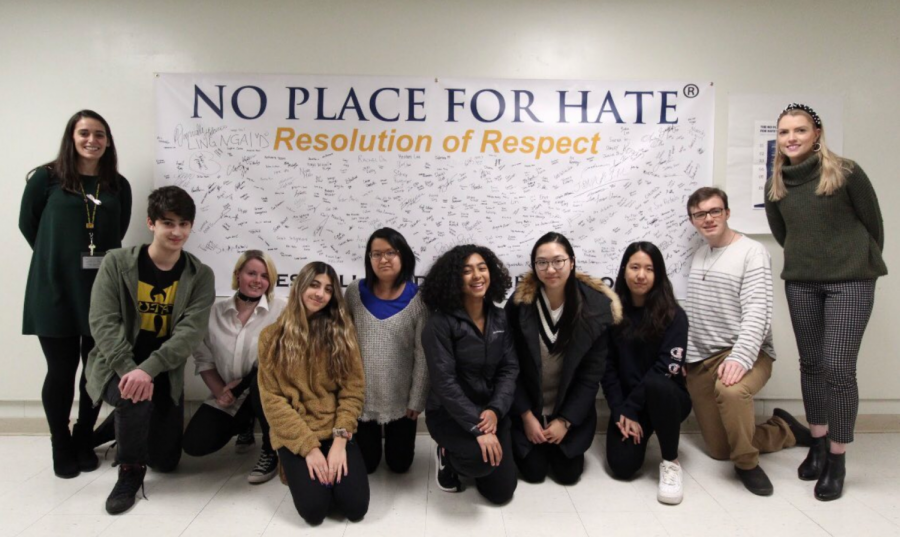CHS Takes a Stand Against Anti-Semitism
Photo Courtesy of @CresskillNPFH
Mrs. McCarthy, Ms. Lynch, and student members of the No Place for Hate Committee pose with Cresskill’s Resolution of Respect Pledge.
January 16, 2020
In October of 2018, white supremacist Robert Bowers entered the Tree of Life Synagogue in Pittsburg, Pennsylvania. He began to shoot, killing eleven congregants and several others. Before shooting, Bowers had taken to social media to express vitriolic comments about Jewish people. This incident — one of the deadliest anti-Semitic attacks in history — left the country shaken. Then, for almost a year, things were relatively quiet for the Jewish-American community — that is, until the last week of 2019, when, on December 28, 2019 in Monsey New York, an intruder with a large knife entered the home of a Hasidic rabbi and wounded five people. This followed a surge of at least ten anti-Semitic outbreaks in the New York region.
Anti-Semitism denotes a prejudiced attitude toward Jewish people and Israel. And now, with social media so accessible, myths can be spread easier than ever. Opinions can be drawn without knowing the whole truth, and an entire society of hate can be formed through these social media platforms. Each post that Bowers made could be seen by the general public, and a lack of proper education would cause many to believe any myths that he disseminates. In order to combat the spread of such damaging narratives, Cresskill High School history classes have decided to dedicate these next few days to creating a dialogue around anti-Semitism in hopes of promoting a better-informed student body.
“This is not just a white supremacist problem; this is a people problem,” says Mr. Fried, special education teacher at Cresskill High School, and a driver of these lessons. With anti-Semitic acts of violence occurring around the world, Mr. Fried wants students to understand “that it doesn’t work towards unifying anybody when any group is being targeted for bigotry.”
Although students have most likely heard about shootings such as that at The Tree of Life Synagogue and the series of shootings in New York, CHS aims to expand this knowledge, and wants students “to be informed of current events occurring in our surrounding area and to feel both physically and emotionally safe in our school environment,” according to CHS principal Mr. Massaro. Although Mr. Massaro knows that different students come to class with different baselines of understanding, he believes that there are “always opportunities for people to increase awareness and understanding of events and topics.”
History teachers Ms. Lynch and Mrs. Stein have been enthusiastically supportive of this initiative. Mrs. Stein, teacher of classes ranging from AP to CP, divided her lesson plans into two days. The first day focused primarily on the historical targeting of Orthodox and Hasidic Jewish communities, and the second addressed anti-Semitism on university campuses. She taught the students to be “tolerant of the viewpoints that [they] do not agree with,” with the ultimate goal being that “students feel safe enough to express their point of view.” While Ms. Lynch addressed the same topic, she approached it through an activity that attempted to debunk common misconceptions about Jews. She said that misconceptions are the main causes of anti-Semitism and hate, as understanding the anti-Semitism in the world will help students “be able to have tools to respond to anti-Semitism throughout their life.”
While for some students, this is relatively new information, for others, this hits close to home. In early January, Keren Binderman, a junior, attended the No Hate, No Fear Solidarity March against anti-Semitism in New York City alongside 25,000 others. Binderman found tens of thousands of people joined together to spread love to have been “an incredible experience, truly breathtaking.” Before going to this event, Binderman had hardly discussed anti-Semitism in school at all. “It’s a bit concerning,” she says, “because I think this subject really needs to be addressed… because it’s a humanity issue, not just a Jewish or Israeli issue.” Although Binderman is not entirely up to date with all the incidents of anti-Semitism in the world, she recognizes that just being taught about these issues through reliable sources, not social media outlets, can really make an impact on those who are yet to comprehend the severity of anti-Semitism.


